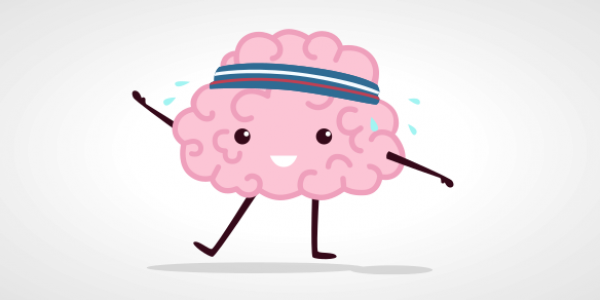Exercise Your Body, Exercise Your Brain

For years, we’ve had an inkling that exercise may be good for the brain. But now, researchers are beginning to understand how this could be!
While we all know the benefits of regular physical exercise in keeping our bodies healthy, there is increasing evidence that exercise may help our brains function better. For the past several decades, researchers have been trying to understand the effect that physical exercise has on attention, memory, and visual sensitivity. According to Richard Maddock, professor of Psychiatry and Behavioral Sciences at the University of California, Davis, “There is a very consistent finding that the brain works better after exercise.”
The problem has been that scientists haven’t really understood exactly why exercise seems to help our brains.
That is, until recently. A number of researchers have been developing technology that allows them to measure the effects of aerobic activity on various aspects of brain activity during exercise, and the results have been very interesting. Kate Wheeling has written about these recent discoveries at Outlook Magazine’s website. Here are a few of the interesting findings:
- Exercise increases brain waves, increasing alertness. Using tools that measure the electrical impulses that our brains generate, researchers have found that aerobic exercise causes our brains to produce brain waves more frequently and with more intensity, which results in many people feeling they are more alert and focused.
- Exercise increases visual sensitivity to the world around us. Some scientists at UC Santa Barbara have been measuring the effects of exercise on the visual cortex, which helps humans notice important aspects of our environment and filter out less important “background noise.” They found a positive relationship between low-intensity cycling and ability to identify specific features during exercise. Other researchers have reported similar findings, suggesting that when humans are engaged in aerobic activity, their visual perceptions are sharper.
- The brain uses exercise to build more neurotransmitters. Richard Maddock and his team found that some of the fuel the body produces during exercise is used by the brain to create more neurotransmitters, which are the chemicals that relay messages around the nervous system. Maddock suggests that exercise may restock the brain with essential neurotransmitters allowing it to operate more effectively. This also may explain why exercise has been shown to alleviate symptoms of depression.
Wheeling goes into considerably more detail about all of this, and gives further examples of how exercise actually improves brain function (including that it may make our brains appear younger!). I’d strongly recommend reading the article.
Overall the message is clear: exercise is good for your brain! It’s not a cure all, or magic bullet, but the research is indicating a strong correlation between exercise and improved focus, attention, cognition, memory, academic performance, and processing speed.
If you need help getting started with exercise check out MSU Moves. You can access the information you need to help you get started with an exercise program, even if you’re a beginner or feeling intimidated by the prospect:
- Before You Start an Exercise Program
- Movement Methods: Strength Training Guide
- Swimming for Fitness
- MSU Movement and Fitness Resources
So, constant reader, check that article out, read up on some of the cited authors’ research, and then let us know what you think. Head over to our Facebook page and drop us a line about what exercise does to your brain.
Related Articles


Laughter: Good for Your Brain
Stop me if you heard this one: humor and laughing is really good for you. That's not a joke. It's science!

What Happens When We Eliminate Boredom?
Right there in your pocket, you have a device that can entertain your brain any time you want, and you'll never have to feel bored again. But, is there a cost to never being bored?





